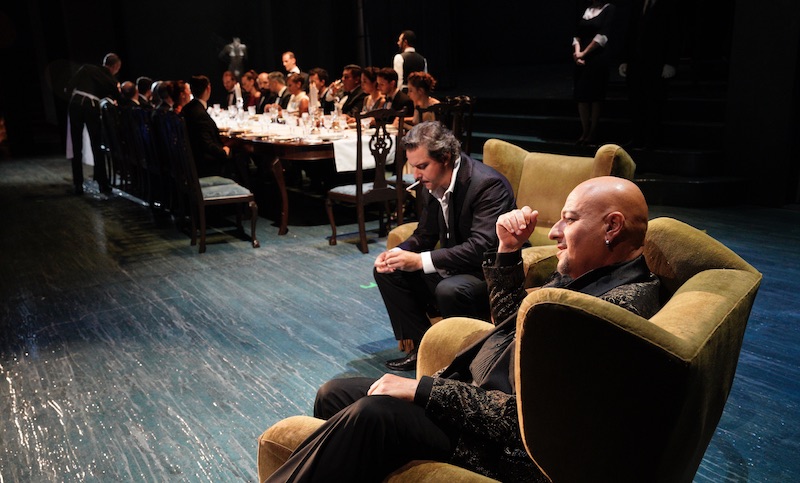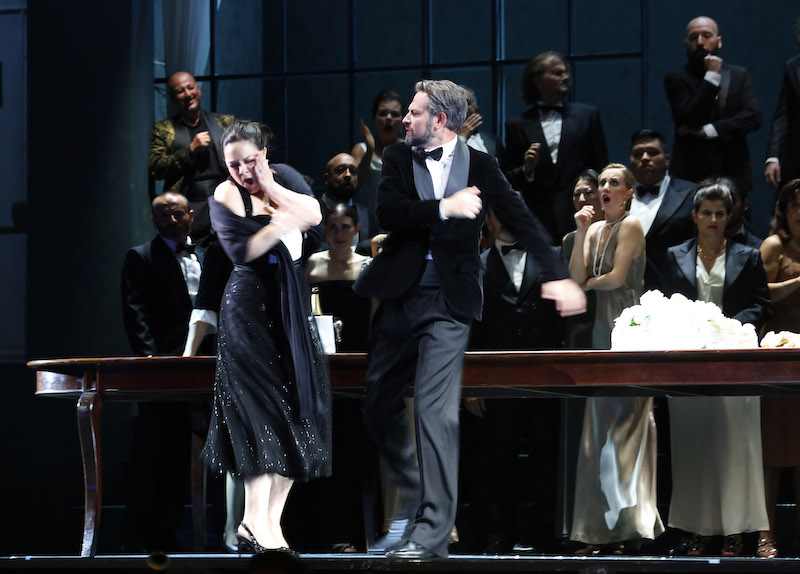Two high concept productions: Rossini’s Otello set in a kitchen with Rossini’s Le Comte Ory providing some eggs. More or less.
For its large scale productions the Rossini Opera Festival once inhabited Pesaro’s center-town Palasport, a venue it shared with the famed local basket team, Scavolini Pesaro. Scavolini, a well known manufacturer of luxury kitchens, agreed to remodel the Palasport into a fine, modern theater for the Rossini Festival, and include a practice court for basketball.
So, in 2006 the Rossini Festival decamped to freeway close, ex-centric Adriatic Arena, now branded as the Vitrifrigo Arena for the duration of the renovations (Vitrifrigo makes refrigerators for yacht kitchens). The arena’s basketball court is now the real estate where an impromptu, fully equipped, 1200 seat theater has been erected each summer for the past 17 years to host the annual three week Rossini Festival season.
It is, simply said, one of the world’s great theaters (its initial echoes have long been eliminated, though the arena’s roof may still be a bit leaky). Each year we are told the next festival will be in the new, PalaScavolini, but each year we are back, happily, at the arena.
The historic, 750 seat Teatro Rossini hosts the festival’s intimate productions.
Rossini’s Otello (1816) is not told in the broad strokes of Shakespeare’s Othello or Verdi’s Otello. It is three high tenors, Otello, Iago and Desdemona’s intended, Rodrigo, plus the doomed bride and her father who enact a nasty domestic drama. A daughter’s duty to her father conflicts with her love for a black man — more simply stated it is the classic Baroque operatic conflict of love and duty with an unhappy ending.
Rossini’s Neapolitan librettist, Francesco Berio, often the young Rossini’s host at gatherings of Naples’ literati, conjured a tale of little moral complexity, vaguely basing his libretto on a brief mention in Giovanni Battista Giraldi’s 1685 novella Un capitano moro, that Desdemona’s parents had tried to induce her to marry someone other than the black man.
In librettist Berio’s tale a father, Elmiro, has chosen a husband, Rodrigo, for Desdemona, though Desdemona is secretly married to the just returned military hero Otello. Desdemona had written a love letter to Otello that fell into Iago’s hands, a letter that Desdemona’s father thinks was intended for Rodrigo who does indeed love Desdemona. Iago helps Rodrigo by showing the letter to Otello, suggesting that it was intended for Rodrigo. Otello and Rodrigo come to blows. You know the rest.
So there was a lot to sing about, and really a lot fancy music created by the brilliant, 24 year-old Rossini.
Just now a Pesaro pianist turned stage director, Rosetta Cucchi, enriched this early nineteenth century idea of an explosive situation by lathering it with the current cause célèbre of male brutality to women (endemic gender violence). Thus we suffered through an exposition during the overture of a man slapping a woman, to the horror of Desdemona’s maid Emilia (who Rossini will then ignore, giving her no aria in the opera). Plus there were small windows high up on either side of the back wall where there were constant videos of women in various situations — you could either attempt to understand what the videos were conveying, or you could follow the plot on the stage. There was no discernible integration of video to stage.

With her designer Tiziano Santi, Mme. Cucchi, envisioned a kitchen and formal dining room as the setting for this domestic tragedy, not confusing us with the monumentality we attribute to the Shakespeare and Verdi tragedies (as was the case in the Pesaro 2007 Giancarlo del Monaco production).
For the dining room of the first act Mme. Cucchi and her costume designer Ursula Patzak, gave cool business suits to the men, classic servant attire to maids and waiters, and flashy evening gowns to the women of the chorus — most likely we were meant to consider them as objects, they were in fact quite attractive. Otello laden in gold braid and medals has the first operatic salvo, a magnificent aria concluding with a plea to love. Forget that Elmiro, Desdemona’s father, later in the act slapped her in the face to the horror of the onlookers.

The entire second act takes place in the kitchen, though we see into the dining room, wherein shapely female forms/objects are in high evidence. The act is a massive musical construction that unfolded in a very intimate space. First a huge aria by Rodrigo after Desdemona informs him she is married to Otello, then a duet in which Iago reveals the misaddressed letter to Otello. A trio continues in which which Otello and Rodrigo duel in the presence of Desdemona followed by a finale in which Desdemona confronts her father Elmiro. It was splendidly staged and sung, vintage Rossini. Forget the gratuitous manhandling of Desdemona as the men fight over her (was it here that bloody, battered women appeared on either side of the stage?).
The final act murder occurs in the now empty dining room. It is a single number, meticulously paced by Rossini. A gondolier’s sad song is heard from afar followed by a splendid willow song and prayer (not the Willow Song in Othello). An arriving storm shatters the sadness that had prevailed. As the storm increases the distraught Otello bursts in to accuse Desdemona of infidelity in a strepitoso duet that climaxes in the clamorous unison exclamation “Notte per me funesta!” Then, in the following calm, Otello murders Desdemona. It was powerful, felt tragedy.
It had nothing to do with battered women. It had only to do with Otello and Desdemona.
And it had everything to do with the excellent conducting of Yves Abel who has proved himself over the years in Pesaro to be a Rossini conductor of the first water, most recently with the splendid 2018 Il barbiere di Siviglia. The maestro is able to achieve a precise flow for the vocal lines, and ascend to the Rossini delirium when it naturally arrives, a rare feat. In Otello, instead, he found the precise Rossini pacing that rendered this mediocre libretto into bonafide tragedy.
While the Rossini delirium is not a factor in Otello, a force of personality and a virtuosity of voice is an absolute necessity. The assembled cast well met this criteria, foremost the two tenors (lead photo) who love Desdemona, Otello sung by Italian tenor Enea Scala, and Rodrigo, sung by Russian tenor Dmitry Korchak. Scala, a participant in the festival’s 2009 Accademia Rossiana has moved through supporting roles in Pesaro to hold the stage now as opera’s most distraught lover. Korchak boasts a warm, beautiful voice well able to find the brilliance in the fioratura of his arias, making him a formidable artistic threat to Otello. Sicilian tenor Antonino Siragusa, the Iago, has proven himself a stalwart and valiant villain over the years in Pesaro.
Desdemona was sung by Italian soprano Eleonora Buratto who brought diva presence to the role, traversing the dramatic vicissitudes of the second act with true suffering, then singing her Willow Song and prayer with felt resignation before exhibiting her fury at Otello’s accusation. Desdemona’s father, Elmiro was sung by Russian bass Evgeny Stavinsky. The role of Emilia was sung by mezzo soprano Adrianna di Paola who had much to say in her recitatives but no chance to expound, though it always seemed like she might be about to. The off stage gondolier song was sung by Julian Henno Gonzalez, and the Doge was sung by tenor Antonio Garés
Michael Milenski
Coro del Teatro Ventidio Basso, Orchestra Sinfonica Nazionale Della RAI, Vitrifrigo Arena, Pesaro, Italy, August 14, 2022